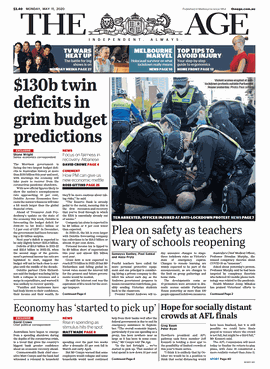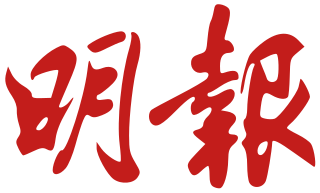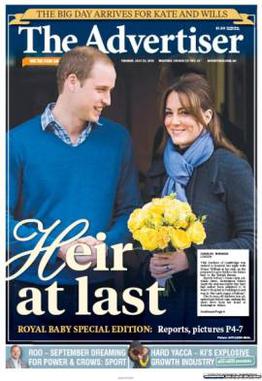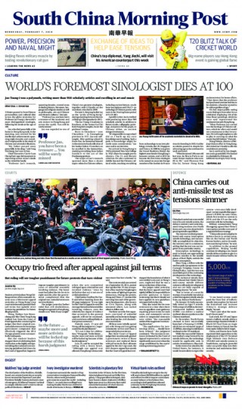Related Research Articles

The Age is a daily newspaper in Melbourne, Australia, that has been published since 1854. Owned and published by Nine Entertainment, The Age primarily serves Victoria, but copies also sell in Tasmania, the Australian Capital Territory and border regions of South Australia and southern New South Wales. It is delivered both in print and digital formats. The newspaper shares some articles with its sister newspaper the Sydney Morning Herald.

Ming Pao is a Chinese-language newspaper published by Media Chinese International in Hong Kong. In the 1990s, Ming Pao established four overseas branches in North America; each provides independent reporting on local news and collects local advertisements. Currently, of the overseas editions, only the two Canadian editions remain: Ming Pao Toronto and Ming Pao Vancouver. In a 2019 survey from the Chinese University of Hong Kong sampling 1079 local households, Ming Pao was listed as the second most credible paid newspaper in Hong Kong.

Hong Kong's media consists of several different types of communications of mass media: television, radio, cinema, newspapers, magazines, websites and other online platforms.

The Standard is an English-language free newspaper in Hong Kong with a daily circulation of 200,450 in 2012. It was formerly called the Hongkong Standard and changed to HKiMail during the Internet boom but partially reverted to The Standard in 2001.

The Advertiser is a daily tabloid format newspaper based in the city of Adelaide, South Australia. First published as a broadsheet named The South Australian Advertiser on 12 July 1858, it is currently a tabloid printed from Monday to Saturday. The Advertiser came under the ownership of Keith Murdoch in the 1950s, and the full ownership of Rupert Murdoch in 1987. It is a publication of Advertiser Newspapers Pty Ltd (ADV), a subsidiary of News Corp Australia, itself a subsidiary of News Corp. Through much of the 20th century, The Advertiser was Adelaide's morning broadsheet, The News the afternoon tabloid, with The Sunday Mail covering weekend sport, and Messenger Newspapers community news. The head office was relocated from a former premises in King William Street, to a new News Corp office complex, known as Keith Murdoch House at 31 Waymouth Street.

The Argus was an Australian daily morning newspaper in Melbourne from 2 June 1846 to 19 January 1957, and was considered to be the general Australian newspaper of record for this period. Widely known as a conservative newspaper for most of its history, it adopted a left-leaning approach from 1949. The Argus's main competitor was David Syme's more liberal-minded newspaper, The Age.

Truth was a Melbourne tabloid newspaper established in 1902 as a subsidiary of Sydney's Truth. It was "a sensational weekly paper with a large circulation, delighting while shocking its readers with its frequent exposure of personal scandal and social injustice. Detailed police and court reports, illustrated by drawings and photographs of prosecutors and defendants."

The South China Morning Post (SCMP), with its Sunday edition, the Sunday Morning Post, is a Hong Kong-based English-language newspaper owned by Alibaba Group. Founded in 1903 by Tse Tsan-tai and Alfred Cunningham, it has remained Hong Kong's newspaper of record since British colonial rule. Editor-in-chief Tammy Tam succeeded Wang Xiangwei in 2016. The SCMP prints paper editions in Hong Kong and operates an online news website that is blocked in mainland China.

ClubONE Riviera, formerly called Star Seafood Restaurant (明星海鮮舫), and earlier called Treasure Floating Restaurant (敦煌畫舫), is a restaurant in Sha Tin, Hong Kong. The restaurant was built with granite taking on the shape of a ship berthing along the shore. The building is situated at the eastern shore of Shing Mun River, near the junction of Siu Lek Yuen Road and Tai Chung Kiu Road. It served Cantonese dim sum and seafood.
Stephen Francis Patrick Aloysius Dunleavy was an Australian journalist based in the United States, best known as a reporter, columnist and editor for the New York Post from 1977 to 1986 and again from 1995 until his retirement in 2008. He was a lead reporter on the US tabloid television program A Current Affair in the 1980s and 1990s.
Kevin Maxwell Sinclair, MBE, was a New Zealand journalist and author who spent more than 50 years reporting the news, over 40 of those in Hong Kong.
In Hong Kong, censorship which refers to the suppression of speech or other public communication, raises issues regarding the freedom of speech. By law, censorship is usually practised against the distribution of certain materials, particularly child pornography, obscene images, and reports on court cases which may lead to unfair trial.
Chance International was a men's magazine founded in Sydney in 1966 by Gareth Powell Associates, which was basically Gareth Powell in association with Jack de Lissa. It used Playboy and Penthouse magazines as a model, creating a magazine that Australia had not seen before with both pictures of beautiful unclothed ladies and articles worth reading. The magazine was originally printed in Australia with the Griffin Press in Adelaide but almost immediately switched to Hong Kong as high quality printing at an affordable price was not then available in Australia.
The Global Times is a daily tabloid newspaper under the auspices of the Chinese Communist Party's flagship newspaper, the People's Daily, commenting on international issues from a Chinese ultra-nationalistic perspective. The publication is sometimes called "China's Fox News" for its propagandistic slant and the monetization of nationalism.
Margaret Mary Jones was an Australian journalist, noted for being one of the first accredited to China after the Cultural Revolution, and first female Foreign Editor on any Australian newspaper. Described as a "trailblazer for women journalists", she wrote for John Fairfax Limited for a total of thirty-three years.

Hu Xijin is a Chinese journalist and the former editor-in-chief and party secretary of the conservative popular media Global Times, a tabloid under the auspices of the Chinese Communist Party (CCP)'s official People's Daily newspaper. He has been accused by the western media of being a political propagandist and an early adopter of China's "wolf warrior" communication strategy of loudly denouncing perceived criticism of the Chinese government and its policies.
Kevin Lau , former editor-in-chief of the Hong Kong daily newspaper Ming Pao, was attacked in the morning of 26 February 2014 as he was getting out of his car in Lei King Wan, Hong Kong by two men who were waiting for him. Lau suffered stab wounds to his back and legs. He was rushed to a hospital, where he underwent emergency surgery. The police and most commentators agree that it was a triad-style attack aimed at maiming without killing.

Robert Chow Yung, BBS, is a Hong Kong journalist and media personality who is a former RTHK radio host. He is currently the spokesman of the pro-Beijing conservative Alliance for Peace and Democracy and founder and leader of the Beijing-approved Silent Majority for Hong Kong movement.
The Hongkong Telegraph was a Hong Kong newspaper founded in 1881.
Inkstone News was an online newspaper platform launched by Hong Kong-based company South China Morning Post Publishers Ltd. in March 2018. It was available as a website and mobile app. The website called itself a "daily digest of China-focused stories". It published a selection of stories every weekday morning (ET) on its website, as well as a daily newsletter and an audio edition on Google Assistant.
References
- 1 2 3 Sinclair, Kevin (December 2007). Tell Me a Story: Forty Years Newspapering in Hong Kong and China. SCMP Book Publishing Ltd. ISBN 9789621794000.
- ↑ "Magistrates' Court on 8 May". The Age. Melbourne, Victoria, Australia. 2 May 1984. p. 15.
- ↑ "Veteran Hong Kong Journalist Henry Parwani Dies aged 67". South China Morning Post. South China Morning Post Publishers Ltd. 25 June 2015. Retrieved 19 September 2017.
- ↑ "120 laid off as Star newspaper folds". South China Morning Post . 14 May 1984.